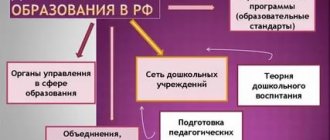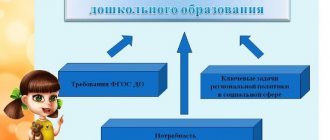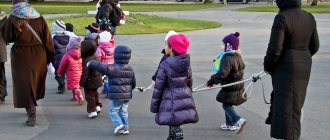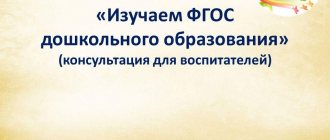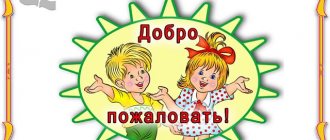Problems and prospects in the preschool education system
Problems and prospects in the preschool education system.
The main goal in the field of modern preschool education is to ensure state guarantees of accessible and high-quality preschool education for all children. Analysis of the main issues of development of the preschool education system allows us to identify key problems: the problem of accessibility of preschool education for children with disabilities, insufficient material and technical base of preschool educational institutions, qualifications of teaching staff that do not fully meet modern requirements. Many issues of further development of the preschool education system require improvement of legislation at the federal level.
Preschool education is aimed at providing equal starting opportunities for preschool children. Over the past decade, preschool education has gone through a rather difficult path of integration into new modern realities, which has significantly expanded the boundaries of responsibility of preschool institutions. The educational program is aimed primarily at creating conditions that meet the modern characteristics of the education and training process. Preschool education in accordance with the Federal State Educational Standard determines the level of general education, where the foundations of a social personality are laid in the education system as a whole, taking into account the established requirements for the conditions for the implementation of the main educational program of preschool education, primarily for the psychological, pedagogical and personnel aspects of the problematic solution of this issue. The key factor in the successful implementation of this state standard is still the teacher. An important point is the task of creating conditions that affect the possibilities of emancipation, first of all, of the teacher, determining the path for self-realization in creating a new impulse for his development.
Today, the priority direction of working with teachers is to increase their professional competence and effective methodological support in the context of the introduction and subsequent implementation of the Federal State Educational Standard for preschool education. It is necessary to change the strategy and position regarding the staffing of preschool educational institutions, provide comprehensive support to employees, inviting specialists to provide psychological prevention of emotional burnout, conduct business games, master classes, organize scientific and methodological education at specially organized workshops.
In order to fit into the modern rhythm, a teacher needs to continuously engage in self-development and self-education based on modern pedagogical technologies. Today this is one of the requirements of the Federal State Educational Standard. The situation in the field of preschool education is changing qualitatively; in recent years, most teachers have mastered innovative programs as part of their course training. A teacher is a person who connects children with the new, as yet unknown world of adults. A teacher has a multifaceted job. To be an educator means to carry the grain of good manners, education and culture, to revive spirituality and lay in the minds and hearts of your pupils the foundations of civic consciousness, self-determination of the personality of each preschooler. If the teacher himself is not successful, cannot find his place and does not see prospects for further development and his own growth, then the student will follow his example. In his pedagogical practical activities, the teacher needs to create conditions for identifying and developing a full-fledged personal resource of each child, using a system-activity approach, which will teach the child the ability to understand a task, analyze solution options, compare, isolate components from a single whole, and not just equip him knowledge, but to develop the ability and desire to learn throughout life. Thus, for the successful adaptation and retention of young staff in preschool educational institutions, it is necessary to create a School of Young Teachers, where everyone will find answers to many difficult questions that arise at the beginning of their professional journey. More experienced mentors must not only be literate and competent, but also skillfully replicate the level of their achievements, interest in increasing the level of competencies and status, both within the team and in the teaching community of their colleagues and like-minded people.
Great importance in the successful implementation of educational activities in preschool educational institutions is currently attached to the position of the parent community, because The head of the preschool educational institution is simply forced to involve various social institutions in solving the problems of the kindergarten: parents, the public. Without outside help, it is difficult to cope with the huge number of tasks involved in organizing the functioning of a modern educational institution. Family and kindergarten are two social institutions that stand at the origins of our future. How many problems arise between them when there is misunderstanding, lack of patience and tact when considering various issues. Lack of mutual understanding, lack of understanding, the full weight of the problem falls on the child’s fragile shoulders. Sometimes you observe how some parents try to move away from raising their child, placing everything on the shoulders of teachers. How to change this situation? How to interest parents in the work of a kindergarten, help them understand the whole situation in understanding the importance of the common requirements of the family and kindergarten? Many people generally believe that kindergarten is a place where the child is looked after while the parents are at home. It is important to understand that parents are the first teachers for their children and in this aspect we see our partnership foundations in the relationship between the preschool educational institution and the family. It is necessary to create such conditions so that parents perceive education not only as a finished product, but share responsibility with teachers in matters of raising children; their active inclusion in the educational process is necessary, thanks to their inclusion in project activities of a search nature based on the expected joint practical activities of students , teachers and parents themselves. This process becomes an integral part of the modernization of education, aimed at ensuring the modern quality of education based on maintaining its fundamentality and compliance with the current and future needs of the individual, society and the state. The decisive role is played by the interest of the teachers themselves, the ability to skillfully orient parents in the characteristics and capabilities of the child to solve the problems of preschool education at the stage of preparation for school.
The active implementation of the educational activities of a preschool institution by teaching staff and specialists, explaining to parents the main tasks of raising and educating children makes it possible to create conditions for a comfortable transition of a child of senior preschool age to the next level of education, and to develop a unified style of interaction between teachers and parents. It is important to competently convey the essence of the purpose of preschool education and create conditions for the successful continuation of education in primary school. Educational work with children in preschool educational institutions provides a sufficient level of skills and abilities necessary for the future schoolchild, such as: communication skills, cognitive activity, and the ability to perform simple intellectual actions. The focus on the development of personal qualities of pupils contributes to the development of important socio-psychological skills and physical qualities that guarantee every preschooler a positive start to school in the future. Parents should be allies of the educator in the education and development of children, and we, educators, need to help parents so that they independently come to the idea that they are able to change their child’s life for the better, make him smart, well-mannered, kind and simply good.
How many articles have been written in the world and how many smart lectures have been given on how to raise our children, inquisitive and kind, funny and noisy. Advice comes from all sides; Scientists, and writers, and methodologists, and educators write, Some go out of their way. Thousands of opinions, simple and complex, Like different courses for a ship, About the fact that one must love carefully And wisdom must be drilled into children From the first steps, well, almost from scratch. What to do? Yes, you can inspire this and that, But the remedy, in my opinion, is according to everyone’s height. Everything here is very complicated and very simple: Be good. That's all!
(E. Asadov)
Love and discipline
— Let's talk about reforming the educational process itself. How do you imagine that?
— It all starts in kindergarten. On average, a child attends it for four years. First: we need to make sure that children feel comfortable in kindergartens. There should be no “gesture” there, like in Soviet kindergartens, when a child peed, they put him on the table, everyone points at him. Or they scold me. Or they cover their eyes with tape.
- No, they don’t do that now.
- Listen, they do it in ways you can’t even imagine. We have a lot of these stories, I could tell you, but I won’t. If a child cannot go to the toilet in kindergarten - he is embarrassed or afraid, and this happens all the time - it means something has happened. Maybe he was judged or laughed at. And educators should treat the child with care - as if they were their own, kindly, with acceptance. The child must acquire basic skills, but first of all, he must simply enjoy his entire childhood. Let him play pranks, run, play, sing, and so on.
- Again, now there are distortions when children are allowed to do whatever they want.
- Agree. Therefore there must be a balance. At Smile Fish we have two rails: love and discipline. Loving a child does not mean allowing him to jump on window sills, hit other children, or run out onto the roadway. Our love is expressed in ensuring that all children in the group feel relaxed, comfortable and, most importantly, safe. We give a certain amount of freedom to each child so that he feels at home.
Discipline is a must. There are psychological studies that when a child sees a leader and knows clear rules, then he feels safe under such control. And when everything is allowed to him, then he is slack, unbalanced, and from this he himself becomes nervous, begins to worry, and is afraid of everything. Therefore, naturally, in our kindergartens there is a clear daily routine: meal times, sleep times, classes, walks. In this case, the child develops a certain internal rhythm.
I would like to note the important mission of the educator. First of all, educators must love children and their profession, work out of vocation and not coercion. The task of a kindergarten teacher is to take care of the health and psychological comfort of all children. On the other hand, the teacher must see the talent in each child, because all children are unique. We believe that educators are generally one of the most important people in a child’s life. Remember Arina Rodionovna with little Sasha Pushkin - she was an ordinary teacher, nanny, and the great Russian poet immortalized her name in his works. This means she did something to unlock his potential, treated him kindly.
Our kindergartens have a “Pyramid of Growing Up” program. Relatively speaking, this is a triangle where the teacher, child and parent communicate with each other. All three of us must interact with each other without fear of communication. In this way, the child's strong traits can be developed. Later, the school teacher should take over the functions of the educator.
— Do you think that education is also primary at school?
- Certainly. Do you remember your first class? I remember well: many children, a huge office. And the teacher says: “Hello, children! Open page number...” And we sit scared at our desks, no one knows anyone. But I went to school as if it were a holiday. What should the teacher do? Build relationships. They gave him children for four years, so what are the grades, what is the first quarter? It doesn't matter at all. At first, especially when the weather is good outside, children with a teacher should walk in parks and so on. They need to get to know each other, become friends, and develop common rules. Can you imagine how more effective such children will be than others?
In elementary school, children are taught practical things that they then use throughout their lives. For example, I don’t remember much from the school curriculum - neither logarithms, nor what a synchrophasotron is, but every day I write, read, solve some kind of micro-equation. Therefore, the main thing for a teacher is insight; he must see the final product. What kind of people will my students become? What competencies will they have? What principles will I put into their lives? What fundamental truths will I give them?
And then this teacher must recommend to parents what talents to develop, so that from the fifth grade a set of lessons is optional. At this time, each child should already answer the question: what will I create? One may try his hand at medicine, while another dreams of becoming a blogger. Let the children experiment. The child must understand how he will improve his life, his country. See yourself in society, what contribution you will bring to this world. In addition, at school, in addition to basic subjects, you need to teach communication, friendship, family building, etiquette, and so on - remember the Smile Fish value wheel. Why not introduce lessons in public speaking and financial literacy - about banks, loans, mortgages? These should be items that are relevant today. Why aren't our children taught this? Why are they not taught life at all?
— What specialists does your company need?
- Different. For me, a higher education diploma is not an indicator at all. Naturally, professional preschool teachers and psychologists work in our kindergartens. But this is not a guarantee that a person will get a job with us. First of all, we give preference to people who really love children and have a lot of ideas, which means that during an interview they can immediately sing ten children’s songs, tell jokes, organize games, and make crafts from scrap materials.
Smile Fish
